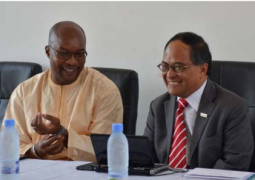
This conference is the third in a series, organized by the French CNRS Institut Ecologie et Environnement (InEE) and the German Leibniz Association (WGL), and will take place from 29th to 31st October 2014 in Aix-en-Provence in France. The third conference will focus on the theme: “Biodiversity and Food Security, from trade-offs Synergies.”
The conference will be opened by a keynote presentation given by Professor José Sarukhán, UNAM, México, and closed by a keynote presentation given by Professor Jacqueline McGlade, UNEP, Nairobi, Kenya.
The purpose of the conference is to discuss the interdependencies between biodiversity and food security under ecological, economic and societal challenges, to strengthen a holistic understanding of the related topics and to overcome trade-offs by developing synergies.
The conference will cover a range of topics in the biodiversity-food security nexus, including impacts of diet change on human and nature including aspects on novel food resources and biodiversity conservation; wild animals consumption and diet change; social-ecological consequences and opportunities of changing farming systems from the perspectives of society and nature; rethinking intensification including aspects on intensification vs. expansion and closed systems like aquaculture; and sustainable use of biodiversity for food security, economic and governance issues.
Speaking to reporters shortly before his departure, Njie said the conference is intended for a broad and multi-disciplinary community of scientists from basic and applied research, involving also policy-makers and other stakeholders concerned with various fields of relevance to biodiversity and food security.
It is expected that the conference will raise the profile of societal-relevant biodiversity research in the participating institutions, as well as opening for new partnerships between German and French scientists, he said.
The conference will also addresses relevant cross-cutting issues, includingbehavioural change of humans due to a growing understanding of sustainability, and an increasing sense of responsibility for nature; technical improvement and development for an effective and sustainable use of resources; increasing use of functional food which seeks to influence major health-related parameters in consumers in a long-term manner; new concepts of health, including the health of humans, animals and ecosystems; development of a science-policy interface (Intergovernmental Platform on Biodiversity and Ecosystem Services-IPBES) including all major stakeholders into the discussion of the topics, he added.
“I am delighted to attend such a high-profile conference that will gather scientists around the world, and I am sure that attending this conference would strongly enrich my future journalism reporting and help me in my prospective career,” Njie noted.
According to him, attending the conference will be a great opportunity to him to get in touch with scientists; as a journalist and a blogger, he will blog and do live tweets during sessions.
At the end of the conference, Njie said he will leave the conference room motivated, empowered and well-connected with scientists, and thanked the management of BAJ Gambia for all the support, mutual understanding and cooperation they have at the office.




